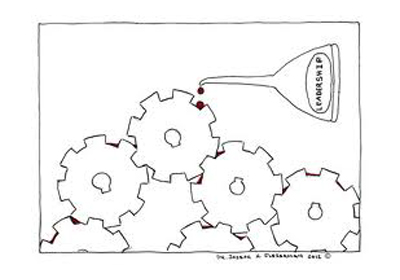
We look at where, as a leader, your formal authority ends, and where genuine leadership kicks in, in order to make real changes:
Your formal authority cannot create genuine change
Change often brings uncertainty, loss, and pain for those it touches – usually the very people who must embrace the change and make it work. Real solutions can only come from those involved, and real change requires that they alter not only their behaviour but their thinking, assumptions, and values as well. You can’t compel change by using your authority alone.
Your formal authority is less likely to elicit people’s knowledge and insight
Every individual in an organisation possesses knowledge, skills, and new ideas of potential value. (If they don’t, it’s your responsibility to replace them with people who do.) Managing people primarily by exercising your formal authority – by telling them what to do without truly seeking their input – is far less likely than a more open approach to capture that full value. Insisting “I’m the boss!” places a huge burden on you.
They weren’t brought up the same way you were!
Well-educated, digitally competent, socially networked, Generation Y are deeply uncomfortable working in conventionally hierarchical work environments. To get the best out of anyone under about 3o years old you need to adapt your leadership, culture and technology.
Generation Y want to discuss everything, have their views valued and respected, ask challenging questions and be inspired. The illusion of control was far easier to maintain when people were relatively less well educated and less connected. The difference now is that Generation Y are not afraid to challenge authority figures, both as customers and as employees, and they have the tech, tools and networks to help them do it.
Adapt and survive…
Adaptability is the key to survival. For governments and businesses it is far safer to adapt to evolution, or revolution, than to challenge it. For Arab countries over the last few years, pre-empting revolution with sincere reforms would have resulted in far less bloodshed than confrontation. Although few businesses are still autocratic, an equivalent strategy is also true for businesses and their leaders.
The key adaptation is in leadership culture and attitude. As a leader, you have to come to terms with the reality that control is an illusion, and that at best you have influence. When leaders migrate from a ‘control’ mindset to an ‘influence’ mindset it can shift the whole culture of your organisation.
With that seemingly simple shift comes the opportunity for real team work, real diversity and real collaboration, all of which significantly enhance innovation and efficiency. Counter-intuitively for some, in business very often less control leads to improved performance.
At the same time as it rumbled around the Middle East, (r)evolution rumbles around the business world. No one person can possibly possess the knowledge, experience, and wisdom needed to make every decision. Organisational success today requires you to secure the involvement of everyone at every level – and you won’t do that by throwing your weight around!
Thanks for the ideas in this post to two sources: a book Being the Boss: 3 Imperatives for Becoming a Great Leader, by Linda A. Hill and Kent Lineback; and Neil Crofts’ blog.


About The Author: Kate Mercer
Kate creates working environments that allow you, your people and your organisation to produce great results through communication, real teamwork and streamlined working practices.
More posts by Kate Mercer